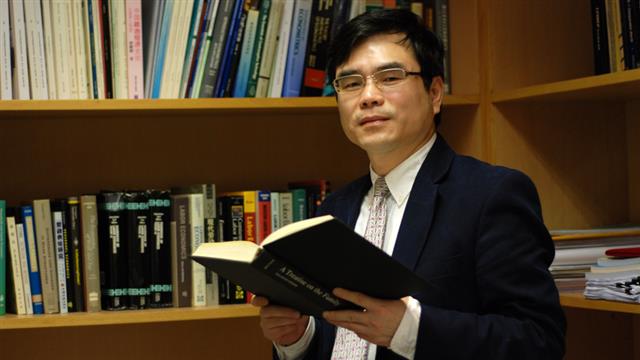Prof. Zhang Junsen
- Wei Lun Professor of Economics
- Chairman, Department of Economics
- Fellow of the Econometric Society
Why did you switch to economics in graduate school after obtaining a first degree in engineering?
Motivated by poverty, most people of my generation studied extremely hard when China resumed its college entrance examination system. I did fine in my engineering major for the first degree, but I did not find it very interesting. By contrast, I was very sensitive to ever-changing social phenomena. So upon graduation I enrolled in an MBA programme, and eventually went to Canada for economic studies with help from a famous economist Prof. Gregory C. Chow.
Why, among all the fields of economics, are you attracted to the analysis of social issues such as crime, fertility, marriage, education, gender bias and old-age support?
I was inspired by a monograph on family economics by Gary Becker who was awarded a Nobel Prize for analysing social issues from an economic approach. It made me realize how powerful economics can be in explaining human behaviour. It is a general misunderstanding that economics only teaches students to make money. Economics is the study of how people make decisions on how best to satisfy their needs with limited resources. In fact, consciously or unconsciously, we all use economics in everyday decision-making even without knowing any economic theory.
How does economics explain human behaviour?
Take the decision to have children as an example. In developing countries, raising children is an insurance against some of the perils of old age. But in countries with developed capital markets, potential filial support is not the main reason for making the decision. In the latter case, the economic analysis views having a child as a 'durable consumption'; it assumes and discovers that child-rearing increases parental happiness. We certainly do not deny the importance of social and psychological factors, and so forth, or that children could be the product of love. We just do away with rhetoric and use as much as mathematical language or graphics to distil an issue down to its economic essence.
Tell us something about your recent election as a Fellow of the Econometric Society.
Established in 1930, the Econometric Society is the most prestigious international society for the advancement of economic theory and application. Among the newly elected Fellows, I am the only scholar from Asia. There are three Chinese scholars previously elected, and they are now teaching respectively at Tsinghua University, Peking University and Shanghai Jiao Tong University. I am the fourth, and the only 'home-grown' scholar. I had only worked for three and a half years in Canada before joining CUHK as a lecturer. Twenty years have gone by. I have worked hard for my achievements which owe much to the academic environment of CUHK.
What impact would the fellowship have on your teaching and research?
It encourages me to aspire to higher goals. Junior professors tend to shape a productive career path by focusing on publication. Having obtained the honour and recognition bestowed by the fellowship, I am at liberty to advance my pursuit in academic and social dimensions. I shall focus more on fundamental research. Recently I have also undertaken some projects on poverty, social inequalities, left-behind children and social mobility.
What keeps you teaching at CUHK for 20 years?
The motivation comes mainly from the passion for academic pursuits. As economists, we are closer to the business world so there are always some outside opportunities in the industry. I have also been approached by and indeed received offers from other universities, but I chose to stay in the end. I enjoy the excellent research environment at CUHK. The natural beauty and good air quality are also among the reasons I like the University.
Over the years you have provided consulting services and advice to governmental agencies. Can you share the experience with us?
I have some mixed feelings about that. I have served in some committees in the government, including then the Commission on Strategic Development, or as a consultant for government agencies. Sometimes they took my advice. For example, when discussing population policy, they gave up the concept of an optimal population size in Hong Kong. But there were also times when nothing was done. On one occasion, I suggested to conduct scientific effectiveness evaluation of social projects as commonly practised in the US, but so far they still have not followed up on that.


